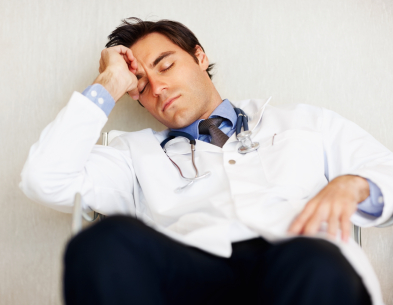
I’ve been a night owl since college, and that sleep pattern continued into my medical school years. My most productive study times were between 10 p.m. and 2 a.m. I would routinely miss early morning classes, knowing that transcripts were available. Pulling an all-nighter to cram for exams was not beneath me, either.
Those habits continued into my otolaryngology residency training at Montefiore Medical Center. This was in the 1990s, before work-hour restrictions were in place. At that time, sleep was a low priority for my peers and me. We considered it a badge of honor to have sometimes stayed awake for two days straight.
Now that I’m board-certified in sleep medicine, I realize that I wasn’t just dead tired—I was dead wrong. Five years ago, I became a morning person by making some simple changes to my lifestyle, exercise and dietary regimen that produced more and better sleep. Now, I can confidently say that at age 45, I am experiencing physical, mental and emotional states that are stronger than ever.
That’s why I believe it is so important for today’s medical students to get the sleep that their bodies require. Chronic low-grade sleep deprivation and poor sleep habits harm not only students’ academic and clinical performance, but also their health.
There are many studies linking even mild sleep deprivation or poor sleep efficiency to lower academic performance. Poor sleep is strongly associated with pathology in almost every organ system, including the cardiovascular, gastrointestinal, immunologic and nervous systems. Worst of all, lack of sleep can lead to errors in judgment that could prove fatal.
What’s most ironic is that despite all the studies, medical schools today spend only a few hours teaching students anything about sleep.
So how can medical students increase sleep quality and quantity? Here are five tactics that might result in better sleep and ultimately improve a student’s chances of higher grades, better evaluations, better match results and a brighter disposition:
- Sleep seven to eight hours per night on a regular basis. It has been shown that sleeping less than six hours is associated with higher rates of obesity, diabetes, heart disease, cancer, dementia and overall mortality risk. But don’t overdo it. Sleeping more than nine hours increases your risk of diabetes, obesity, mortality and dementia. Try not to “sleep in” on weekends either, as this disrupts your circadian rhythms, making it more difficult to answer that Monday morning bell. Getting an adequate amount of sleep will optimize your short-term memory, recall and cognitive function.
- Don’t eat or drink alcohol within three to four hours of bedtime. Having extra stomach juices can predispose someone to gastroesophageal reflux disease, which can also lead to pharyngeal reflux, arousals (abrupt transitions from sleep to wakefulness) and lower sleep efficiency. Since even people without obstructive sleep apnea will have occasional apneas or even short, subapneic obstructive events while sleeping, stomach juices can be suctioned up into the throat, causing more arousals and pharyngeal inflammation. This can lead to throat clearing, post-nasal drip, coughing and hoarseness, which are usually worse in the morning. Alcohol can also increase stomach-acid secretion and relax throat muscle tone, leading to increased obstructions and arousals.
- Treat any nasal congestion. Nasal congestion causes vacuum forces downstream, which aggravate tongue and soft palate collapse.
- Avoid any personal electronic device screen time within two to three hours of bedtime. Blue light is known to diminish melatonin production, which is important for helping you fall asleep. Compounding the situation is that many of the newer screens are extra bright, meaning they are high in the blue-light spectrum. If you must use a computer just before bedtime, use blue-blocking glasses or a computer program that lowers blue-light levels a few hours before bedtime.
- If you snore, or feel unrefreshed no matter how long you sleep, get checked for obstructive sleep apnea. It’s estimated that 80 percent of people with sleep apnea are undiagnosed. (This includes physicians.)
These tips are important for everyone, regardless of profession, but as medical students prepare to take care of patients, it’s imperative that those students set a good example. As I’ve learned, you really should practice what you preach. Lights out.


Comments on this entry are closed.
Dr. Park,
Very interesting and insightful posts. You must have spent some time in Medical School on the Head and
Neck Service in Pittsburgh:-)
Best Regards
Jeff
Yes, there’s very much a reason Dr. Park why medical schools do not teach about teach hygiene. The level of Stockholm Syndrome is very high in medical students and sleep deprivation is a way to weed out the “weak”. It’s sick and it needs to stop.
What magnitude of blue light (or power, which correlates with magnitude over time) is required to interfere with sleep?